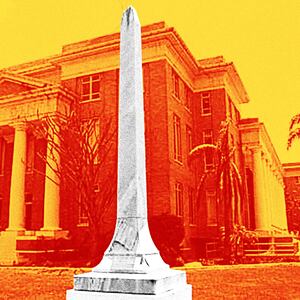Far-right critics have railed against Washington and Lee University for submitting to “cancel culture” after the school removed plaques commemorating a Confederate-era horse that’s been dead and long-forgotten for over 150 years.
The horse’s legacy had been so insignificant that even conservatives admitted it wasn’t a “major” historical figure.
University officials removed two markers dedicated to the memory of Robert E. Lee’s horse, Traveller, in July, The College Fix reported. Lee was Traveller’s saddled companion during and after the Civil War, and the horse died a few months after Lee’s death in 1871.
According to a July press release from Washington and Lee, the first plaque was on a stable, which was said to be Traveller’s last home. The other marker was a gravestone for the horse which was buried near the University Chapel, also the burial site for Lee and a national landmark. (Both markers dedicated to Traveller were donated by the United Daughters of the Confederacy.) Two other plaques that commemorated where Lee took the university’s presidential oath of office and where his office was located were also removed.
“Over the past several years, Washington and Lee’s Board of Trustees has engaged in a careful review of the University’s symbols, names, and practices with the understanding that these communicate the University’s values and are an important component of its reputation,” the school said in a statement, iterating its rejection of Confederacy ideology. “Washington and Lee University is an educational institution. Its campus is neither a museum nor an appropriate repository for Confederate artifacts, and as such, the Board determined that a number of plaques on campus should be relocated to a museum to be appropriately interpreted.”
Following the removal, university officials said the markers would be relocated to an exhibit about Lee and new ones would take their previous positions.
However, as of August, conservatives, seemingly hell-bent on preserving Confederate equine history, claimed that neither of Traveller’s plaques had been replaced.
“It appears that Washington and Lee University is not only canceling Lee but even his horse,” George Washington University Law professor Jonathan Turley fumed on X, the platform formerly known as Twitter. “Traveler [sic] was originally put down for untreatable tetanus but will now be put down again by equally untreatable cancel culture.”
Turley admitted that Traveller was not a “major historical feature,” but claimed the horse was an “iconic symbol in the [Civil War].”
“These sites can offer a sense of authenticity and continuity to history. Universities should not just preserve as much of this history as possible, but to place that history in context. We can contextualize that history ... and still spare the horse,” he wrote.
Others chimed in, echoing similar bouts of revisionist history.
“And the horse you rode in on,” Texas U.S. Sen. Ted Cruz wrote in solidarity.
“Washington & Lee University has cancelled Robert E Lee’s horse,” a social media user tweeted. “Because we’re that fucking delicate and infantile.”
“They’re literally erasing everything about America,” another social media user posted. “These ppl are mutants. They do not deserve to live in a country where ancestors died for their betrayal.”
Meanwhile, others had more historically accurate rebuttals and praised the school, which still happens to be named after a Confederate leader.
“Traveller was not honored for any reason other than the myth behind the guy who sat on his back, Robert E. Lee, who viewed the horse as his property no different than the Black persons he fought to keep [enslaved],” wrote Georgia State University law professor Anthony Michael Kreis.
“Canceling the traitors who rebelled against the Republic is honoring those who founded it,” wrote national security analyst Shay Khatiri. “Canceling Lee is honoring Washington. The two should have never coexisted—and could not forever. One must have been dropped, and gladly the traitor is the one gone.”
In a statement to The Daily Beast Wednesday, Washington and Lee University said that a marker for Traveller was immediately replaced at the gravesite, and another for the stable will be “installed in the fall.”







